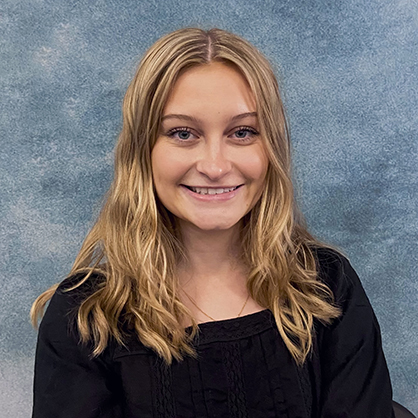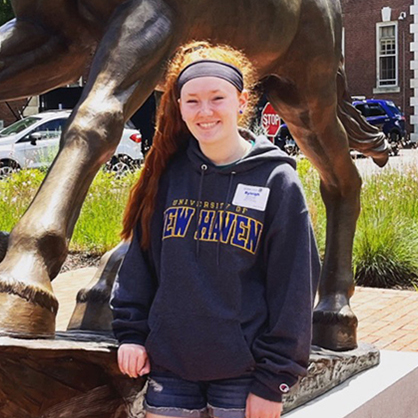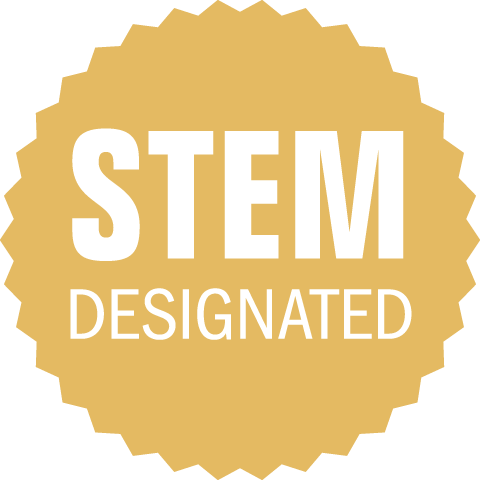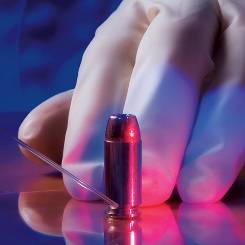
EMILY VERGE ’24
Forensic Science Major Reflects on Her Time as a Member of the Charger Community
As a forensic science major at the University of New Haven, you will learn to use science and technology to uncover evidence that can "testify" in court and impact criminal or civil cases. You will sharpen your powers of observation and learn how to identify and interpret such evidence in one of the most respected forensic science programs in the country, a program enthusiastically endorsed by the Forensic Science Education Programs Accreditation Commission (FEPAC).
And, you will have the opportunity to study in the world-renowned Henry C. Lee Institute for Forensic Science. This state-of-the-art center – named after the legendary investigator – features working crime-scene labs and high-tech visual displays, and serves as a go-to resource for law enforcement agencies around the globe.
To thoroughly prepare forensic science majors for careers in forensic science, natural sciences, and criminal justice professions, as well as post-graduate educational or training opportunities.
The Bachelor of Science in Forensic Science degree offered at the University of New Haven is an academically rigorous program, focusing heavily on the natural sciences and including a curriculum that addresses various aspects of the criminal justice system and professional practices associated with careers in forensic science.
The University of New Haven uniquely prepares you for success. Click here to see the outcomes of forensic science majors.
Important note for all interested applicants: "Those seeking careers in this field should be aware that background checks similar to those required for law enforcement officers are likely to be a condition of employment."
- Education and Training in Forensic Science: A Guide for Forensic Science Laboratories, Educational Institutions, and Students, page 7.
Read this document here.
Our faculty are leaders and innovators in their fields, bringing both deep professional experience and academic rigor to the classroom.

Forensic Science Major Reflects on Her Time as a Member of the Charger Community

Forensic Science Major is a Semifinalist for Prestigious STEM Scholarship

Forensic Science Major: ‘Being a First-Generation Student Means a Lot to Me’
The information below is designed to show the many possible careers you could pursue with your major. The research is provided by Encoura, the leading research and advisory firm focused exclusively on higher education. It includes median national salaries and industry growth projections over the next decade. Click here to view the full report.
Chemist
4% Growth 2017-2027
Forensic Scientist
24% Growth 2017-2027
Analytical Technologist
14% Growth 2017-2027
Introduction to basic techniques, material, and other aspects of crime scene photographs. Theory and practice of photographic image formation and recordings. Laboratory exercises with emphasis on homicide, sex offenses, arson, and accident photograph techniques.
A study of the methods and techniques of scientific crime scene investigation, documentation and recognition of physical evidence, collection, and crime scene reconstruction.
The theory and techniques of optical microscopy required to use the microscope for evidence detection, analysis, and evaluation. Microscopical methods of analysis and polarized light microscopy will be covered in lecture and laboratory.
In-depth examination of several subjects in modern criminalistics, including hair and fiber analysis and comparison, arson accelerants and explosive residues, glass comparisons, and forensic chemistry.
The University of New Haven offers a wide variety of in-depth courses that create a transformational educational experience for our students. To view the complete list of courses you'll take while pursuing a Bachelor of Science in Forensic Science, check out the Academic Catalog:
Get an inside look at what differentiates the University of New Haven and how your experiences as a student will prepare you for success.




All University of New Haven students have access to the many resources available through the University’s Career Development Center, which has been named one of the best in the nation by The Princeton Review.
From career assessments, networking, and job shadowing to on-campus interviews and salary negotiation, the Career Development Center provides the skills and connections to identify a meaningful career and an opportunity to pursue your passion.
Learn MoreWhether you're still in high school or are transferring from another college, we offer full- and part-time opportunities for undergraduates from inside the U.S. and abroad. The admission process can begin as early as the end of your high school junior year.
The Application Process
We offer a comprehensive financial aid program, with students receiving assistance in the form of grants, scholarships, student loans, and part-time employment. Funds are available from federal and state governments, private sponsors, and from university resources. More than 85 percent of the University's full-time undergraduate students receive some form of financial assistance.
Learn More